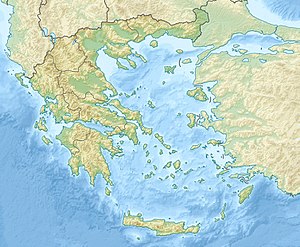
Back معركة فارسالوس Arabic Farsal döyüşü Azerbaijani Битка при Фарсала Bulgarian Emgann Pharsalus Breton Batalla de Farsàlia Catalan Bitva u Farsálu Czech Brwydr Pharsalus Welsh Slaget ved Farsalos Danish Schlacht von Pharsalos German Μάχη των Φαρσάλων Greek
| Battle of Pharsalus | |||||||||
|---|---|---|---|---|---|---|---|---|---|
| Part of Caesar's invasion of Macedonia during Caesar's Civil War | |||||||||
 | |||||||||
| |||||||||
| Belligerents | |||||||||
| Caesarians | Pompeians | ||||||||
| Commanders and leaders | |||||||||
|
Julius Caesar Mark Antony Gnaeus Domitius Calvinus Publius Cornelius Sulla |
Pompey Titus Labienus Metellus Scipio Lucius Domitius † Lucius Cornelius Lentulus | ||||||||
| Units involved | |||||||||
|
| |||||||||
| Strength | |||||||||
23,000+
|
41,000–52,000+
| ||||||||
| Casualties and losses | |||||||||
| 200–1,200 killed |
30,000–39,000[2][3][4][i]
| ||||||||
Location within Greece | |||||||||
The Battle of Pharsalus was the decisive battle of Caesar's Civil War fought on 9 August 48 BC near Pharsalus in Central Greece. Julius Caesar and his allies formed up opposite the army of the Roman Republic under the command of Pompey.[6] Pompey had the backing of a majority of Roman senators and his army significantly outnumbered the veteran Caesarian legions.
Pressured by his officers, Pompey reluctantly engaged in battle and suffered an overwhelming defeat, ultimately fleeing the camp and his men, disguised as an ordinary citizen. Eventually making his way to Egypt, he was assassinated upon his arrival at the order of Ptolemy XIII.[7]
- ^ History, Military (8 July 2019). "The Battle of Pharsalus, 9 August 48 BC | The Past". the-past.com. Retrieved 8 August 2023.
- ^ "Battle of Pharsalus | Summary, Facts, & Significance | Britannica". www.britannica.com. Retrieved 18 July 2023.
- ^ "Pharsalus (48 BCE) – Livius". www.livius.org. Retrieved 18 July 2023.
- ^ History, Military (8 July 2019). "The Battle of Pharsalus, 9 August 48 BC". the-past.com. Retrieved 18 July 2023.
- ^ Caesar, BC III 99,1.
- ^ "The Battle of Pharsalus". World History Encyclopedia. Retrieved 22 November 2021.
- ^ Goldsworthy, p. 431.
Cite error: There are <ref group=lower-roman> tags or {{efn-lr}} templates on this page, but the references will not show without a {{reflist|group=lower-roman}} template or {{notelist-lr}} template (see the help page).
